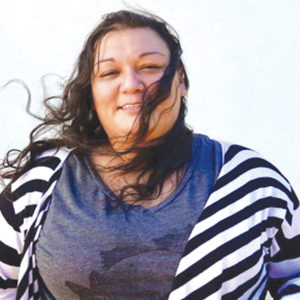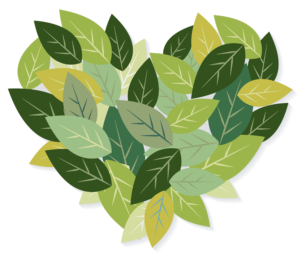A Deep Love for the Common Ground

My name is Black Thunderbird. My colonized name is Mysti Babineau. I am a climate justice organizer and lobbyist with Minnesota 350, which is the state affiliate of the national 350.org founded in 2008 by the author/environmentalist Bill McKibben and some college students. The term 350 comes from the parts per million of carbon in our atmosphere that scientists broadly agree is the safe level. We’re currently over 400.
A little bit about me and how I came to be in this movement: I spent a lot of my time as a youth in the foster care system, and I’ve lived all over Minnesota. I have a deep love for this territory that we call Minnesota—from the grasslands to the boreal forest, to the numerous lakes and rivers. I truly love our Mother Earth.
As an Ojibwe, I was taught that the health of our communities is directly proportionate to the health of our planet. Our common ground is the ground that we stand upon, and if that ground and the water and the air are not okay, we’re not going to be okay. A few years ago I was thinking of my children and about how there’s no time now. I looked around at the world, and I knew that I had to do everything I could to make it a world they could survive in, where they would have opportunities to thrive.
So, I started doing some low-energy audits for community members and smaller businesses, and then I thought, that’s not doing enough. Maybe if I got into construction and made sure that new buildings were energy efficient, using resource materials and so on, that would be away to help build this better future for my children. I think I knew that wasn’t drastic enough for me. Then, in 2016, the Dakota Access Pipeline protest unfolded at the Standing Rock reservation, and I knew I couldn’t stay silent anymore. I watched my relatives being brutalized for trying to protect water that millions depend on.
What does climate justice mean to me? I’ve been with MN350 for about two years now and I’ve noticed a shift whereby what we would traditionally consider social justice issue groups and environmental groups are moving towards one another. That’s a beautiful thing to see.
This country was built on the blood and bones of its original inhabitants. Our government was set up in a way that kept the oppressors in power while the oppressed stayed oppressed. I firmly believe that we won’t all be able to move forward together unless we’re genuinely moving together in a good way. What does that mean? I’m privileged that I have a job that allows me to fight for what I believe in, that provides me a steady paycheck to provide a roof for my children. How do I use that privilege? I show up at the capitol. I lobby for bills or against bills that would be bad for our environment. Within the organization we are starting to use the privilege we have to be able to show up in order to take a stand on social justice issues.
So, how do climate change and social justice relate? How does the fossil fuel industry affect sex trafficking, for example? The multinational energy transportation company Enbridge is trying to build a tar sands oil pipeline through northern Minnesota that will go through several reservation boundaries and will clip the Mississippi headwaters. This is something people don’t think about: we’ll have all these construction workers here from out of state, mostly from Oklahoma. They’re coming here for long periods of time, leaving their families at home, and they have a lot of money. The temptation to spend that money on drugs and women is often too much for these men to resist. So, when they’re coming through and they’re building these pipelines, women in these communities are going missing. And it’s not just our sisters, it’s our boys too.
How do we use our privilege to stand for those who are taken? In this case the fossil fuel industry contributes to sex trafficking, but this is an epidemic that has faced our people for some 500 years; Christopher Columbus was the first person to take our sisters and sell them.
I think we all understand that the earth is changing. When you look scientifically, our maple trees are moving north. I sat in a committee hearing this legislative session and I heard people much smarter than me state that my boreal forests—my medicines—are going to be gone in fifty years. Minnesota’s not going to look like Minnesota anymore; we’re going to look like Kentucky, and that broke my heart.
I shared with you my name that my ancestors gave me. I’m a part of the Bear Clan within my tribe, and the Bear Clan is responsible for knowing the herbs and plants, and for protecting those medicines. To hear that these medicines my people have used for millennia are going to be gone—it’s heartbreaking. My people took hundreds and thousands of years to figure out what these plants could be used for. It’s not pagan. It’s not witchcraft. It has been scientifically proven, for example, that sage removes bacteria from the air. When we burn that sage, we’re using it to cleanse. The cure for cancer could be right out there in the field. Remedies for anxiety, for numerous afflictions that take our loved ones could be right out there and we don’t have to pay for it. We’re losing that.
 When I think about my own community, I often think about the other communities that have been left behind. I graduated from Lincoln Elementary in North Minneapolis. I was over there recently, and heard the fear and the worry in mothers talking about their children having asthma due to the air that they have to breathe, compounded by the worry of being able to afford medical assistance (what if I lose my job? Do I qualify for the county?). The thought of your child not being able to breathe is something that no mother, no father, no grandmother, no auntie or uncle should ever have to think about.
When I think about my own community, I often think about the other communities that have been left behind. I graduated from Lincoln Elementary in North Minneapolis. I was over there recently, and heard the fear and the worry in mothers talking about their children having asthma due to the air that they have to breathe, compounded by the worry of being able to afford medical assistance (what if I lose my job? Do I qualify for the county?). The thought of your child not being able to breathe is something that no mother, no father, no grandmother, no auntie or uncle should ever have to think about.
So, how do we unite? I think there are so many answers to that question, and there is so much hope. I’ve only been focused on the state legislature for a couple of years, but we’ve had so many successes. One thing I’ve learned is that when we show up in numbers, when we show up and we bring our friends, and we show up for our friends, we all do better. And by removing barriers to communities traditionally left behind, then we can quit asking: How do we best represent these stories? We don’t have to worry about that anymore because they’ll be with us. We all have a unique perception and view of the world and we’re going to need all of that.
Because the science on climate change is scary. Sometimes I can’t breathe when I read the reports, and I think that we only have ten years. I’ll cry, and I’ll go home, and I’ll look at my kids. But we have to build the future. We have to dismantle the systems of oppression and pollution to build something beautiful. What if, instead of city zoning, we thought about community planning? What if you lived within walking distance of your doctor, of your community garden, of your workplace? Countries across the ocean are doing this. You have countries that are banning fuel-injected automobiles by 2030. We can do that here.
We are very fortunate in Minnesota to have so many natural resources. I think sometimes we take that for granted. And we’re leaders here. We have some of the strictest environmental regulations in the country. I really feel that if we all were to come together and leave our labels and what separates us at the door, and we really ground ourselves in the ground, there’s nothing we can’t do together.
As an Ojibwe, I was taught that the health of our communities is directly proportionate to the health of our planet. Our common ground is the ground that we stand upon.
I was apprehensively happy when Democrat Tim Walz was elected governor of Minnesota. And what did people power do? What did unity do this year? We got Walz to refile the Enbridge Energy pipeline (Line 3) appeal. We got him to say that climate change is real and that it’s a priority for his administration. His administration is legitimately talking about putting through some of the amendments in the 100-percent renewable clean energy bill put forth this year by Democratic State Rep. Jamie Long. We are making progress, and we’re also showing up for those causes that our neighbors are unable to participate in.
I think sometimes it’s easy or maybe human of us to feel so weighed down. When you’re going to these events, you’re going to these hearings, you’re going to these public meetings, it’s that same group of forty people you see everywhere. Now, what if we had childcare at these events? What if we were passing out bus cards and gas cards for our community members and our neighbors to attend? Then we wouldn’t feel so lonely. We would see that this movement is bigger than what’s being shown to us right now.
I firmly believe that we need to take the lead and offer our guidance. I do not like being referred to as Indigenous. I feel that dehumanizes me by putting me in a large group. I am an Anishinaabe. I am Ojibwe. Our people knew how to live in harmony with the land. We didn’t have prisons. There were no locks because everybody had a role, everybody was taken care of. That’s not just a story that was passed down—it’s in my DNA. When I see these horrific environmental disasters, I legitimately cry. That pain comes from deep inside of me; it’s in my blood to love this land. It’s in my DNA to fight and to think about the seven generations coming after me.
So, I encourage everyone to do some deep reflection and think about the world you want your great-great-grandbabies to grow up in. What does it look like? What does her community look like? What does his education look like? And I want you to talk to your friends and your neighbors and your coworkers. Share your ideas, organize, reach out—there is so much more good in this world than there is darkness.
